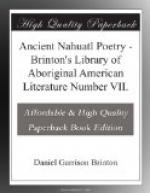Most of the poems in this collection are not assigned to any author, but this, and apparently the one following, are recorded as the compositions of Tetlapan Quetzanitzin. He is evidently the personage spoken of by Sahagun as “King of Tlacopan,” as present with Montezuma on the occasion of his first interview with Cortez. Later in the struggle Tetlapan appears as the associate of Quauhtemoctzin, the “King of Mexico.” (See Sahagun, Hist. de la Nueva Espana, Lib. XII, cap. 16 and 40.) M. Remi Simeon explains the name to mean “he who deceives the people by magic;” deriving it from quetza, he places; te, the people, tlepan, on the fire. A simpler derivation seems to me possible from tetlapanqui, miner, or quarryman (literally, stone-breaker), and quetzalli, red; quetzatzin, the lord or master of the miners.
Both this and the following are war songs, and have marked similarity in thought and wording. The introduction of the Spanish Dios was doubtless substituted by the scribe, for the name of some native god of war, perhaps Huitzilopochtli.
1. Aua; this word I take to be a form of the interjection yahue, or, as Olmos gives it in his Grammar, aa.
2. nepohualoyan; “the place of counting or reckoning,” from pohua, to count. The reference is not clear, and the translation uncertain. In some parts of ancient Mexico they used in their accounting knotted cords of various colors, like the Peruvian quipus. These were called nepohualtzitzin.
4. This verse is remarkable for its sonorous phrases and the archaic forms of the words. Its translation offers considerable difficulty.
xontlachayan, I take to be an imperative form from tlachia, to look, with the euphonic on.
teoatl tlachinolli, literally “the divine water (i.e. blood), the burning,” and the expression means war, battle. In one of his sermons Fray Juan Bautista describes the fall of Jericho in the words, otlaltitechya in altepetl teuatl tlachinolli ye opoliuh, and explains it, “the town was destroyed with fire and blood” (Sermones en Lengua Mexicana, p. 122). The word tlachinolli is from chinoa, to burn.
quetzalalpilo; a compound of quetzalli, a beautiful feather, and tlalpiloni, the band which passed around the head to keep the hair in place.
5. melchiquiuhticaya; “he who presented his breast,” an imperfect, reflexive form. Molina gives melchiquiuh petlauhqui, with the translation despechugado. Vocabulario Mexicana, s.v.
NOTES FOR SONG VII.
The second specimen from the muse of Tetlapan Quetzanitzin is the noblest war song in the collection. It is an appeal to his friends to join in a foray to Chiapas. The intoxication of the battle field is compared to that produced by the strong white wine prepared from maguey, which was drunk only on solemn occasions. The bard likens the exhaustion of his fellow warriors from previous conflicts, to the stupor which follows a debauch, and he exhorts them to throw it aside.




